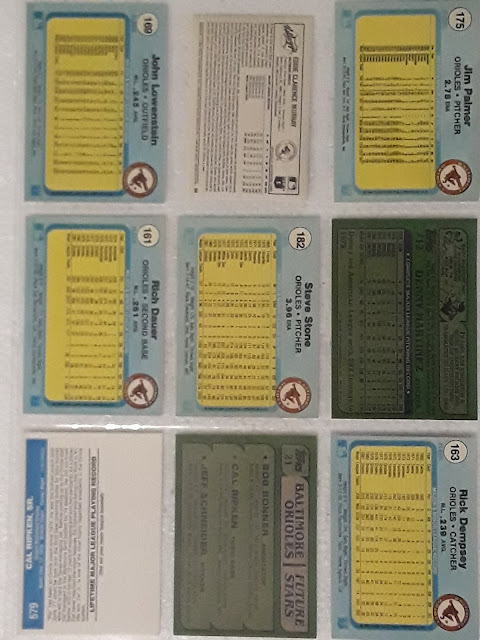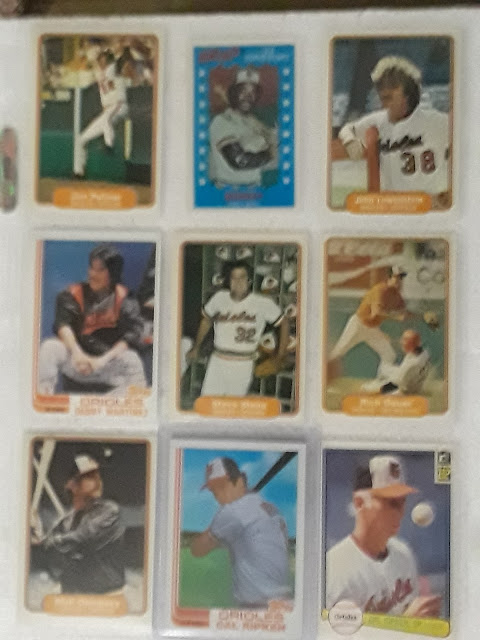The Cards
Fleer #175 Jim Palmer - In 1981, Palmer had a disappointing season, finishing with a 7-8 record and looked nothing like the ace of the Orioles' staff as he had been for the last decade plus. He would rebound in 1982 with a 15-5 mark and leading the AL in WHIP. He was once again in elite company, posting an ERA+ of 129 for the year, which helped him finish 2nd in the Cy Young voting. He'd been the Cy Young winner 3 times in his career, as well as a 20 game winner 8 times. He won a game in the World Series in 1966, 1970, and in 1983, with his team taking the whole enchilada each time. He was a first ballot Hall of Famer in 1990 with over 92% of the vote.
Kellogg's 3-D Super Stars #64 Eddie Murray - Steady Eddie was feeling the 2nd Place thing quite strongly in the early 80s. 1981 started a strong of 5 straight top 5 MVP finishes, but not once resulting in winning the award. In '81, Murray led the AL in Homers and RBI and had an OPS+ of 156. In fact his OPS+ was 156 again in 1982, and 83. In '84. he led the AL with a 157 OPS+, while also leading the AL in Walks (and Intentional Walks) and OBP. He was durable and dependable, with 27-33 homers and over 100 RBI as a near lock every season. He'd finish with over 3,200 hits and 504 Homers in his career, and is Major League Baseball's All-Time Leader in Sacrifice Flies. The 8 time All Star was a tremendous defender at 1st base, and was also a first ballot Hall of Famer like his teammate Jim Palmer.
Fleer #169 John Lowenstein - Lowenstein was known for his dry, witty banter with reporters and though he didn't make the National Baseball Hall of Fame, his 1982 Fleer Card shows he's a first ballot Style Hall of Fame member. 1982 was actually one of his best MLB seasons, coming towards the end of his 16 year career. He hit a career high 24 homers and 66 RBI while playing in a platoon with Gary Roenicke. The Lefty hitting Lowenstein got the lion's share of plate appearances and made the most of them. He was used as a utility man for a good portion of his career, which began in Cleveland. It was there that he generated some ironic attention when he publicly declared his disdain for "fan clubs." Some kindred spirits formed the Lowenstein Apathy Club, which involved sending the sardonic super-utility man letter signed in invisible ink that expressed their disinterest in his batting average and baserunning. Some expert-level smart-alecks even designed banners for home games that said "Hey Steiner" followed by 20 feet of blank white cloth.
Topps #712 Denny Martinez - "El Presidente" was a fan-favorite and a very solid rotation option for nearly 25 years. In 1981, he led the AL in victories, and was the clear-cut heir apparent to the role of staff ace in Baltimore. He followed it up with another fine season with a 16-12 record. Early in his career, Martinez was a big time innings eater. His 18 complete games in 1979 led the AL, and in 2021 it would have been more than everyone in both leagues combined. He struggled with alcohol addiction in the mid eighties, but learned to control his addiction and reinvented himself on the mound. He would have a magical season in 1991 for the Expos, when he tossed a perfect game and led the NL in ERA and shutouts. His 245 career wins are the 2nd most by any Latino pitcher in MLB history, trailing only the legendary folk hero Bartolo Colon. Martinez was the first player born in Nicaragua to appear in a major league game, and he remains the most prolific major league player from that country. He has more complete games than Roger Clemens and Greg Maddux, and his 30 career shutouts ranks respectably high among his peers.
Fleer #182 Steve Stone - The 1980 Cy Young Winner was out of baseball by 1982, and it was all thanks to his dominant curveball. Stone was a solid starting pitcher at the back end of the rotation for 4 teams in the 1970s - the Giants, White Sox, Cubs, and finally the Orioles all saw flashes of brilliance, but Stone put it all together in 1980 with a 25-7 record. He won 14 straight decisions at one point, and it was all thanks to his decision that spring training to go all in with his curveball. The fallout from his career high 250 innings pitched was severe elbow tendonitis that limited him to just 12 starts in 1981. He was retired from the baseball diamond by the time his Fleer card was in packs. Stone was done playing but far from done with the game. He became the broadcast partner of Chicago legend Harry Caray, and has been a mainstay with the Cubs and the White Sox on both radio and television broadcasts since 1983.
Fleer #161 Rich Dauer - A self proclaimed "tough out but easy out," Dauer was a light hitting middle infielder with a great glove. Primarily used at second base, Dauer had a streak of 86 games without an error in 1978. The streak included another record of 425 straight chances without committing an error. He was especially tough to strike out, but was a career .257/.310/.343 triple slash hitter, which translated to a below league average hitter for his career. He was actually a hitting star in College with USC, where he helped lead his team to College World Series wins in 1973 and 1974. He didn't have a ton of hitting highlights in the big leagues, but did hit a homer in game 7 of the 1979 World Series, which would be the Orioles' only run in a losing effort.
Fleer #163 Rick Dempsey - Dempsey was also known as defensive wizard just like Dauer. His skills behind the plate gave him the opportunity to play regularly for the Orioles in the 1983 World Series, and he responded with 4 doubles and a homer to earn MVP honors. Dempsey would play for another World Series winner in 1988 as a backup to Mike Scioscia in Los Angeles. His career OPS+ of 87 wouldn't impress many, but his 2 world championship rings certainly makes him the envy of all his peers.
Topps #21 Bob Bonner / Cal Ripken, Jr. / Jeff Schneider -
Bobby Bonner was a great fielder at short, but unfortunately for him the prototype of the new "Slugging Shortstop" was coming up right next to him. The Orioles had its share of all-glove no hit guys on the team with Dauer and Dempsey. Bonner and Ripken were both up for the same spot to take over for long time Orioles Short Stop Mark Belanger, who was also famously fielding rich and power poor. Bonner couldn't keep up with Ripken's bat and ended up finding a different calling - he became a missionary and trains other missionaries and ministers in Zambia.
Jeff Schneider saved one game for the Orioles in 1981, by giving up a walk and double but still managing to get the final out for a 6-5 squeaker of a win. That off-season, he was the throw-in player in a deal with the Angels for Dan Ford. Ford hit a clutch homer in the 1983 World Series for the O's, so Baltimore fans can thank Jeff Schneider for his small contribution there! Schneider was called up in the same transaction that resulted in Cal Ripken's call-up as well, so it's fitting to see him alongside Ripken on this card.
Cal Ripken played a bunch of games for Baltimore, most of them in a row. People think that's pretty neat.
Donruss #579 Cal Ripken, Sr. - You may have noticed in recent posts that 1982 Donruss was not one of my favorites. I will say that what I love about that set is the inclusion of coaches (not just managers! individual coaches). It didn't hurt that Cal Jr. was the #1 prospect in game. Even though they didn't know he'd be the AL Rookie of the Year, they had a pretty good hunch that he'd be in the conversation. Ripken Sr. was a baseball lifer, long-time coach in the Orioles organization, and would even become the manager for a brief period in 1987 and 88. The elder Ripken was a catching prospect, but a shoulder injury that did not heal properly ended his playing career early on. He became a coach and scout for the Orioles in 1961, though he still played sparingly when teams in the org needed a catcher. He had a tough and competitive personality, and his ethos as a coach influenced generations of Orioles players from Jim Palmer and Eddie Murray to his sons Billy and Cal, Jr. to many many others.

that's what it would have looked like if I wanted to give myself a heart attack thinking about this card just chilling in a binder all loosey goosey - I couldn't even take a decent picture of it!




I've never used a scanner - it can be done!
ReplyDeleteI don't like the Orioles but those are nine great cards there, not a loser among them.
Do you have a certain threshold value-wise for cards that you won't put in a binder?
ReplyDeletemaybe not in terms of $$ value, but replacing a 1982 Topps Traded card of Ripken might be harder than most cards from the 80s. I just didn't want to take it out of the rigid holder it was in. If I had put the card in a binder right away I think I'd feel fine leaving it in there.
DeleteThe one Oriole that's obviously missing from this page is Lenn Sakata ;D
ReplyDeleteGreat page. The Palmer stands out to me, because I liked him back in the early 80's.
No promises as I haven't started putting 1983 in pages yet, but I am a fan of his 1983 Topps card!
Delete